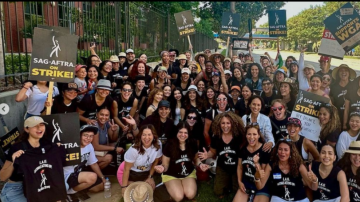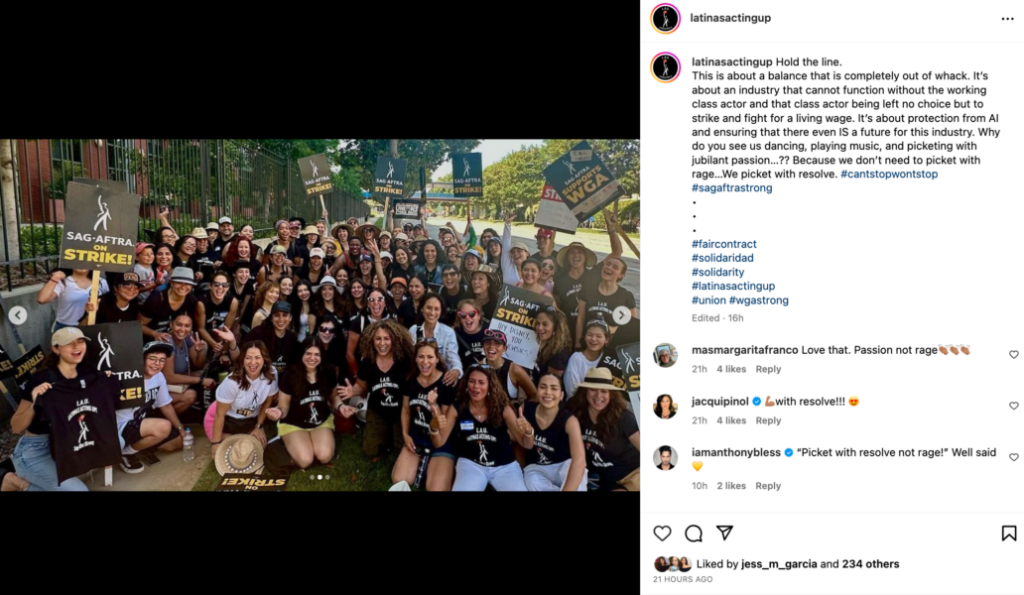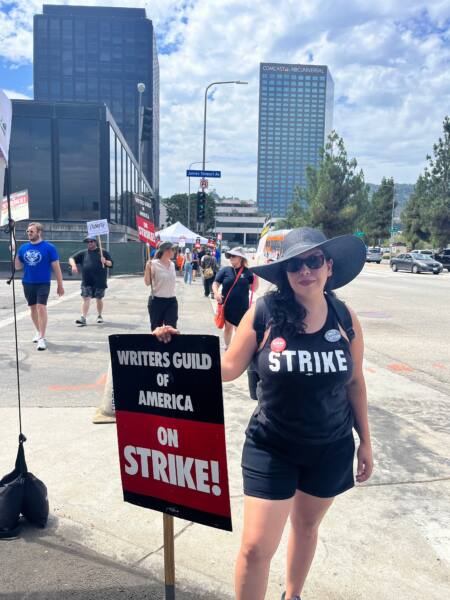Latinas Are On the Frontlines of the SAG-AFTRA & WGA Strike
The impact of the Latinx community on the film and television industry cannot be understated, especially by Latina writers and actors

Photo: Instagram/@latinasactingup
The impact of the Latinx community on the film and television industry cannot be understated, especially by Latina writers and actors. Some of the most beloved films and shows today have included Latina talent both in front of and behind the camera including recent releases like Flamin’ Hot, Gordita Chronicles, and With Love. So when a project becomes successful, one has to wonder where exactly a majority of the money goes. News flash: it isn’t to the talent who made it exist in the first place but to executives at streaming services, corporations, and production companies who reap the rewards of a outdated system.
The strike began on May 2 after negotiations between the Writers Guild of America (WGA) and the major studios stalled followed by the Screen Actors Guild (SAG-AFTRA) going on strike July 14. It is the first time both unions have been on strike since 1960. Productions of scripted television shows and films have since halted, impacting not just the entertainment industry, but adjacent industries including catering, local restaurants, prop houses, set builders, professional drivers, makeup artists, and florists. Yet after 100 days, there has been no real progress despite the staggering pay difference between executives and writers that only reinforces the need for change. One executive made $498,915,318 between 2018 and 2022, according to a Los Angeles Times report, that’s 384 times the average pay of a Hollywood writer.
We’ve seen the coinciding protests for better pay, better business practices, and the establishment of pension and healthcare. Latinas are done being undervalued and underpaid and Hollywood is facing a huge reckoning as they, under the informal group “Latinas Acting Up,” occupy the picket lines to change the system for the better. Actresses and writers have been at the frontlines including Diana Maria Riva, Lisa Vidal, Gloria Calderón Kellett, Marcella Ochoa, and Ilana Peña who are also using their social platforms to raise awareness.
“I’m passionate about the art form and the profession that is acting. And if the working class actor, working in the shadows of some pretty big profits and eight figure salaries, cannot earn a living in this profession, then I fear the profession, and ultimately the art, will not survive,” Riva tells HipLatina. “I’m fighting alongside my union to protect our member’s ability to, at the very least, earn a living wage and own the use of my own voice, image and likeness.”
The numbers don’t lie. Between SAG-AFTRA’s approximately 160,000 members and WGA’s 11,500 members, the ongoing strike is the largest disruption to the film and television industry since the beginning of COVID-19 and arguably one of the most important. Both labor unions are not only protesting unfair pay and minimum wage but also usage of AI as replacements for writers/actors, low residual payments (money that’s paid to TV actors for reruns and streaming of a finished show), poor business practices, and toxic industry culture.
The WGA is also fighting to require that writers be on set and extend health care benefits. The issue of pay and industry treatment is particularly crucial to Latinas from either union, who are less likely to make substantial earnings from their projects no matter their role and who lack other Latina industry professionals to mentor and advocate for them. Even today, the industry is overwhelmingly white male-dominated and focused on the bottom line, leaving Latinas to fight just to be in the room let alone to paid fairly and get opportunities behind and in front of the camera.

“I’m on strike because this industry is at a turning point. Artists deserve to be paid fairly for their work, to make a sustainable living in this career path, to not live in fear of machines taking our jobs. These corporations have the money, they just don’t want to give it to us, even though the reason they have the money is because for years they’ve profited off the art we make,” Ilana Peña, creator/writer/director of Diary of a Future President, tells HipLatina.
“As the entertainment industry has welcomed more diverse voices, we’ve seen stories onscreen that previously hadn’t been told and increased representation in front of the camera and behind the scenes. It’s no coincidence that as soon as that started taking off was when we started seeing these voices silenced – just so the corporations could save a dollar here and there. My show is just one example of so many.”
Actresses including Mayan Lopez (Lopez vs Lopez), Isabella Gomez (One Day at a Time), Jessica Marie Garcia (On My Block) have been joining forces and collectively the presence of Latinas throughout the strike has been a powerful testament to unity and sisterhood in the face of adversity. From organizing flash mobs to “Suavemente” and Pitbull songs to chanting in Spanish, they’ve brought a ray of fun and hope in an otherwise frustrating situation. All with the intention of making themselves known and amplifying the cause.
“The strike holds immense significance as it represents the vital role that writers and actors play in shaping the landscape of film and television. With a track record of crafting over 4,000 episodes of scripted programming and numerous films annually, we are the creative backbone of the industry. However, the ongoing strike is a response to an unprecedented challenge to our compensation and working conditions,” Kellett (One Day at a Time, With Love) tells HipLatina. “This struggle marks a pivotal moment, reflecting the urgent need for a fair agreement with studios. By standing united, we aim to secure a deal that not only acknowledges our instrumental contribution but also ensures our ability to take part in the success of our creations. This strike is a resounding call for a sustainable career and equitable recognition for the stories we bring to life. We all want to get back to work and hope for a fair deal soon.”
Some Latinas have also spoken out online about the realities that come with present residuals providing actors checks for amounts that are less than a dollar. Constance Marie, (George Lopez show, Selena, With Love) posted a candid video showing the astoundingly low residual payments that she’s received for her work on the Freeform series Switched at Birth (2011-2017). They only reached as high as 74 cents even though she was a regular cast member for all five seasons and the show is available on streaming services including Hulu.
“Our contracts were based on a 40 year old model that no longer applies. AMPTP/Studios have not negotiated for a fair share when it comes to streaming,” she said in the caption.
As if low pay wasn’t insulting enough, some Latinas like writer/director/producer Marcella Ochoa (My Name is Maria de Jesus, Madres) have dealt with being asked to work for free. Ochoa, who has been a strike captain for the WGA, tells HipLatina about the importance of fair compensation.
“We are all fighting for the future of our careers. One of the many reasons writers are on strike is to regulate the amount of endless free work we do. As a screenwriter, I’m constantly asked to do free work on scripts with no guarantee of being hired for the next step and our union is fighting for us to be fairly compensated for this work. I hope an agreement can be reached to provide all writers with fair compensation and regulate AI. I’m proud to be a WGA strike captain and grateful to our sister unions and everyone who has shown support for our cause.”

So the fight carries on and despite the WGA strike inching closer to becoming the longest strike in Hollywood history (the 1988 strike lasted 154 days), recent news indicates a possibility that talks can resume. Carol Lombardini, president of the Alliance of Motion Picture and Television Producers (AMPTP), “has asked the WGA Negotiating Committee to meet with AMPTP negotiators on Friday. We expect the AMPTP to provide responses to WGA proposals,” according to a message sent to WGA members Thursday, Aug. 10. The organizations last met Aug. 4, though there was no agreement to resume bargaining. No word yet on SAG negotiations at the time this story was published.
“We are not asking for everything. We are asking for what’s fair for ALL artists. And until we get it, we’ll be out there on the lines demanding it,” Peña says.
Additional reporting by Virginia Isaad

















